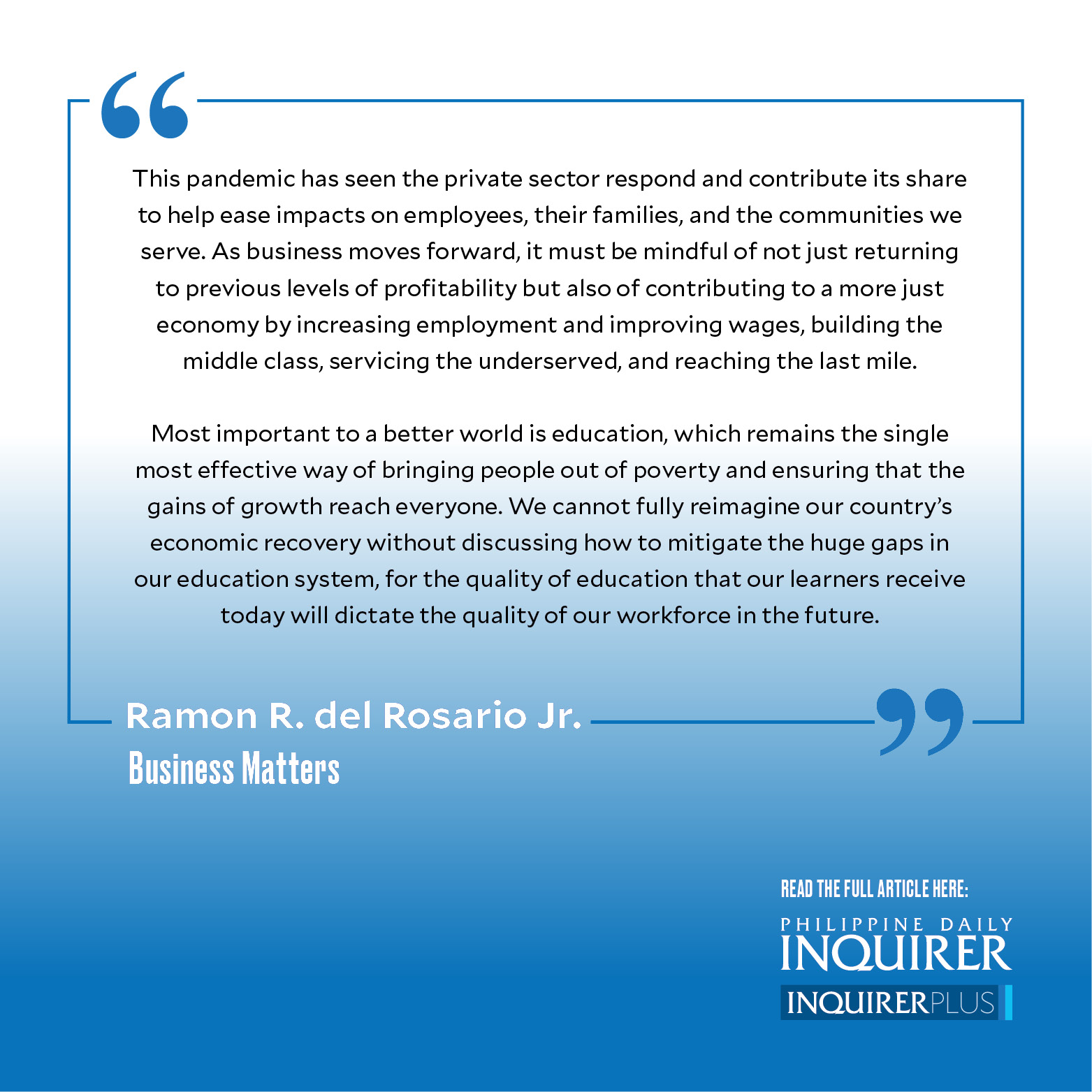
In this pandemic, going beyond survival is a call to look to more than just recovery and use these extraordinary times to build a more just and equitable, resilient and sustainable economy and country.
Let me first start with business recovery. It is obvious that the pandemic changed the way business is conducted. The definition of time and space altered. The move to a digital economy accelerated a thousandfold, changing the definition of necessary infrastructure from roads to bandwidth and transforming the way businesses reach and interact with customers. Such massive transformation will need equally massive government support. The investments needed to address underemployment, support struggling small business owners, bring our farmers’ harvest to markets, and connect off-grid areas to the world require so much resources that only the government can make a significant dent.
However, the government still cannot go at it alone. This pandemic has seen the private sector respond and contribute its share to help ease impacts on employees, their families, and the communities we serve. As business moves forward, it must be mindful of not just returning to previous levels of profitability but also of contributing to a more just economy by increasing employment and improving wages, building the middle class, servicing the underserved, and reaching the last mile.
Most important to a better world is education, which remains the single most effective way of bringing people out of poverty and ensuring that the gains of growth reach everyone. We cannot fully reimagine our country’s economic recovery without discussing how to mitigate the huge gaps in our education system, for the quality of education that our learners receive today will dictate the quality of our workforce in the future.
This is why the Philippine Business for Education is raising the alarm on the learning crisis. Our goal is to shine a light on the problems of education that are begging to be addressed and call on all sectors of society to act, for these problems threaten our nation’s very survival and prospects, in many ways more than COVID-19.
This dismal situation is made even worse as inequalities are further widened due to school closures. Parents, teachers, and students themselves were barely keeping up with the new learning requirements. Last school year alone, more than one million students dropped out of school.
The private sector, as part of a multisectoral effort, offers recommendations for the short term and the long haul:
First, we need to draw a roadmap to resume face-to-face classes as our system is just not built to fully benefit from the promise of blended learning. Second, we must deal with malnutrition and stunting among children. We must aggressively implement the Philippine Action Plan for Nutrition to equip our children to begin learning. Third, we also need to increase the allocation of resources for education. LGUs can build safe learning spaces and provide digital learning resources for students. Fourth, learning should also be assessed consistently and independently through an autonomous assessment agency. Insights from these assessments can be used to bridge learning gaps. Fifth, we also need a strong teaching force to ensure the quality of learning. With the TEACH Bill already filed in the Senate and the House of Representatives, we seek to attract the best and brightest to join the profession. Lastly, we need better complementarity between public and private schools. Rather than treating the other as competitors, public and private schools should regard each other as comrades in the fight against the learning crisis.
To bring all these to fruition, a multisectoral Education Commission or EdCom should be convened within the next six months. The new Edcom should include not only legislators, but also representatives from the academe, business sector, civil society organizations, teacher organizations, learners, and parents. This diversity is crucial in setting strategic and systemic long-term policy reforms to go beyond recovery.
Quality education for all will take the country to greater heights. It will allow us, after these truly traumatic pandemic times, to build an economy that is genuinely for every Filipino.
——————
Ramon R. del Rosario Jr. is a trustee of the Makati Business Club and chair of the Philippine Business for Education. This column is an edited version of the speech he delivered during 1Sambayan’s Talakayang Bayan series with the theme “Usapang Pangkabuhayan: Paghilom at Pagbangon” held on June 23, 2021.
——————
Business Matters is a project of the Makati Business Club (makatibusinessclub@mbc.com.ph)